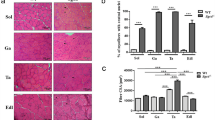Abstract
CCN2 or connective tissue growth factor (CTGF) is a matricellular protein that regulates several cellular processes. In skeletal muscle, CTGF is a key modulator of fibrogenesis, is increased in pathological conditions such as muscular dystrophies, and plays a major role in the pathology outcome. Overexpression of CTGF in skeletal muscle of wild-type mice results in muscle damage, fibrosis, and reduction of strength. In contrast, a decrease in CTGF in dystrophic mice increases strength and reduces damage and fibrosis. Thus, CTGF is a relevant target to study in skeletal muscle pathology and its possible modulation by different treatments or potential new drugs to develop new strategies for the treatment of muscular dystrophies. We summarize the techniques used to detect CTGF in the skeletal muscle of dystrophic mdx mice.
Access this chapter
Tax calculation will be finalised at checkout
Purchases are for personal use only
Similar content being viewed by others
References
Leask A, Parapuram SK, Shi-Wen X, Abraham DJ (2009) Connective tissue growth factor (CTGF, CCN2) gene regulation: a potent clinical bio-marker of fibroproliferative disease? J Cell Commun Signal 3:89–94
Kubota S, Takigawa M (2015) Cellular and molecular actions of CCN2/CTGF and its role under physiological and pathological conditions. Clin Sci (Lond) 128:181–196
Sun G, Haginoya K, Wu Y, Chiba Y, Nakanishi T et al (2008) Connective tissue growth factor is overexpressed in muscles of human muscular dystrophy. J Neurol Sci 267:48–56
Morales MG, Gutierrez J, Cabello-Verrugio C, Cabrera D, Lipson KE et al (2013) Reducing CTGF/CCN2 slows down mdx muscle dystrophy and improves cell therapy. Hum Mol Genet 22:4938–4951
Morales MG, Cabello-Verrugio C, Santander C, Cabrera D, Goldschmeding R et al (2011) CTGF/CCN-2 over-expression can directly induce features of skeletal muscle dystrophy. J Pathol 225:490–501
Author information
Authors and Affiliations
Corresponding author
Editor information
Editors and Affiliations
Rights and permissions
Copyright information
© 2017 Springer Science+Business Media New York
About this protocol
Cite this protocol
Acuña, M.J., Brandan, E. (2017). Analysis of Pathological Activities of CCN2/CTGF in Muscle Dystrophy. In: Takigawa, M. (eds) CCN Proteins. Methods in Molecular Biology, vol 1489. Humana Press, New York, NY. https://doi.org/10.1007/978-1-4939-6430-7_43
Download citation
DOI: https://doi.org/10.1007/978-1-4939-6430-7_43
Published:
Publisher Name: Humana Press, New York, NY
Print ISBN: 978-1-4939-6428-4
Online ISBN: 978-1-4939-6430-7
eBook Packages: Springer Protocols




